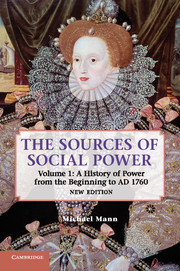Book contents
- Frontmatter
- Contents
- Preface to the new edition
- Preface
- 1 Societies as organized power networks
- 2 The end of general social evolution: how prehistoric peoples evaded power
- 3 The emergence of stratification, states, and multi-power-actor civilization in Mesopotamia
- 4 A comparative analysis of the emergence of stratification, states, and multi-power-actor civilizations
- 5 The first empires of domination: the dialectics of compulsory cooperation
- 6 “Indo-Europeans” and iron: expanding, diversified power networks
- 7 Phoenicians and Greeks: decentralized multi-power-actor civilizations
- 8 Revitalized empires of domination: Assyria and Persia
- 9 The Roman territorial empire
- 10 Ideology transcendent: the Christian ecumene
- 11 A comparative excursus into the world religions: Confucianism, Islam, and (especially) Hindu caste
- 12 The European dynamic: I. The intensive phase, a.d. 800–1155
- 13 The European dynamic: II. The rise of coordinating states, 1155–1477
- 14 The European dynamic: III. International capitalism and organic national states, 1477–1760
- 15 European conclusions: explaining European dynamism – capitalism, Christendom, and states
- 16 Patterns of world-historical development in agrarian societies
- Index
- References
7 - Phoenicians and Greeks: decentralized multi-power-actor civilizations
Published online by Cambridge University Press: 05 July 2013
- Frontmatter
- Contents
- Preface to the new edition
- Preface
- 1 Societies as organized power networks
- 2 The end of general social evolution: how prehistoric peoples evaded power
- 3 The emergence of stratification, states, and multi-power-actor civilization in Mesopotamia
- 4 A comparative analysis of the emergence of stratification, states, and multi-power-actor civilizations
- 5 The first empires of domination: the dialectics of compulsory cooperation
- 6 “Indo-Europeans” and iron: expanding, diversified power networks
- 7 Phoenicians and Greeks: decentralized multi-power-actor civilizations
- 8 Revitalized empires of domination: Assyria and Persia
- 9 The Roman territorial empire
- 10 Ideology transcendent: the Christian ecumene
- 11 A comparative excursus into the world religions: Confucianism, Islam, and (especially) Hindu caste
- 12 The European dynamic: I. The intensive phase, a.d. 800–1155
- 13 The European dynamic: II. The rise of coordinating states, 1155–1477
- 14 The European dynamic: III. International capitalism and organic national states, 1477–1760
- 15 European conclusions: explaining European dynamism – capitalism, Christendom, and states
- 16 Patterns of world-historical development in agrarian societies
- Index
- References
Summary
In this chapter I discuss the emergence and development of the two major decentralized civilizations of the first millennium b.c., Phoenicia and Greece. I concentrate on Greece because it is considerably better documented: We can distinguish the principal phases of its dialectic of development. I argue that the massive contributions of both peoples to the development of social power is to be attributed to the decentralized, multi-level nature of their civilizations, appropriate for taking advantage of the geopolitical, military, and economic legacy of their region, especially that bequeathed by the Near Eastern empires of domination.
I suggest that two principal dialectics can be discerned in the emergence of Phoenicia and Greece as “leading edges” of contemporary power. The first, discussed briefly and tentatively, concerns the possibility that these civilizations were part of a macrohistorical process. In this case, decentralized multipower-actor civilizations lying on the marches of established empires of domination exploited the success plus the institutional rigidity of those empires to “emerge interstitially” and establish their own autonomous power organizations. After a long, successful process of power development, however, their own organizations became institutionalized and rigid. Now they become vulnerable in their turn to new empires of domination lying on their marches. Such a process can be traced in the first millennium b.c. The extent to which it was, indeed, part of a macrohistorical process will be left to the concluding chapter.
- Type
- Chapter
- Information
- The Sources of Social Power , pp. 190 - 230Publisher: Cambridge University PressPrint publication year: 2012



